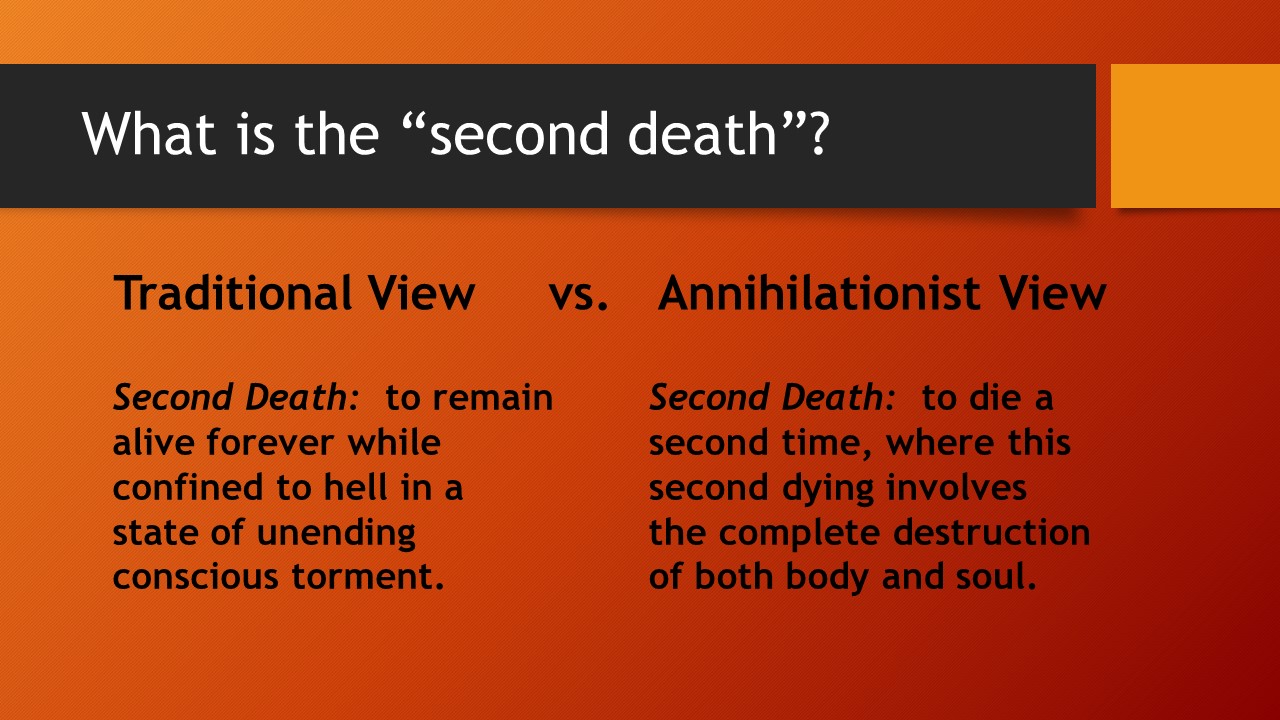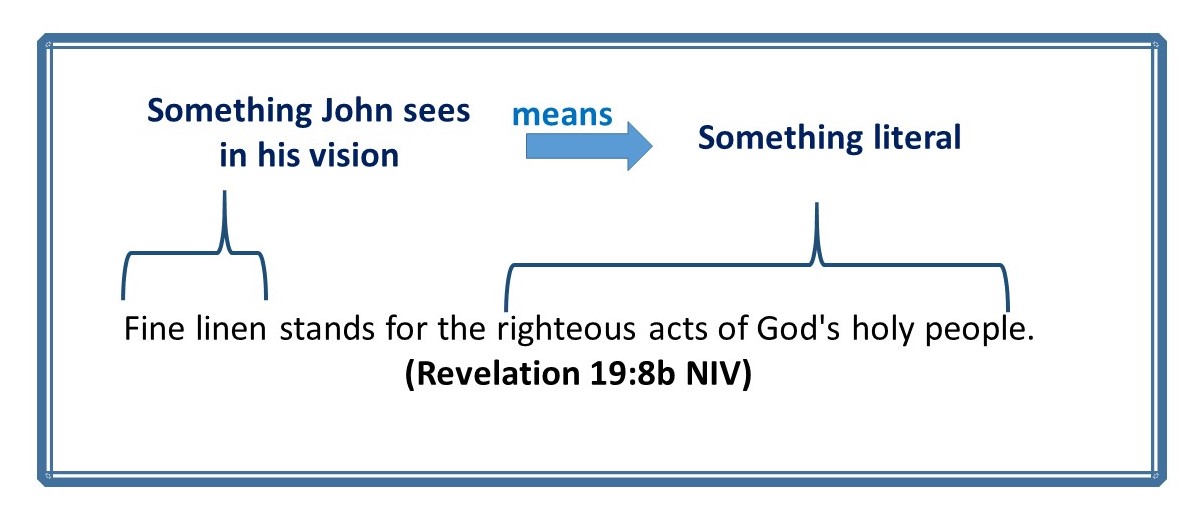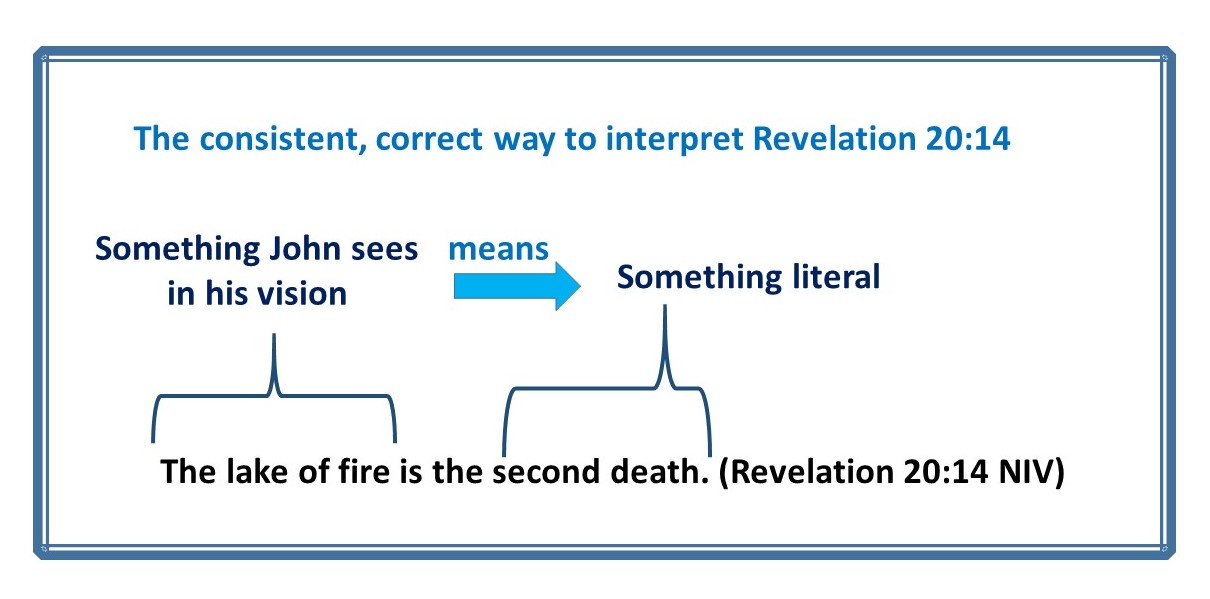- Aug 21, 2003
- 29,127
- 6,152
- Country
- United States
- Gender
- Male
- Faith
- Baptist
- Marital Status
- Married
- Politics
- US-Others
Eight verses from the NT which conclusively show that "aion" definitely means "eternity" and "aionios" definitely means "eternal."
.....The definition of “apposition” from a Greek grammar.
[1] 1 Timothy 1:17
(17) Now unto the King eternal, (1) immortal,(2) invisible, the only wise God, be honour and glory for ever (1) and ever (1). Amen.
(1) αἰών/aion (2) ̓́αφθαρτος/aphthartos
In this verse “aion” is in apposition, see def. below, with “immortal.” If “aion” means “age(s),” a finite period, God cannot be for “a finite period” and “immortal” at the same time. God is “eternal” and “immortal” at the same time. “Aion” means “eternal.”(17) Now unto the King eternal, (1) immortal,(2) invisible, the only wise God, be honour and glory for ever (1) and ever (1). Amen.
(1) αἰών/aion (2) ̓́αφθαρτος/aphthartos
[2] Romans 2:7
(7) To them who by patient continuance in well doing seek for glory and honour and immortality,(2) eternal (1) life:
“Aion” is in apposition with “immortality.” If “aion” is only a finite period, believers cannot seek for “a finite period,” and “immortality” at the same time. But they can seek for “eternity” and “immortality” at the same time. “Aion” means “eternal.”(7) To them who by patient continuance in well doing seek for glory and honour and immortality,(2) eternal (1) life:
[3] 2 Corinthians 4:17-18
(17) For our light affliction, which is but for a moment, worketh for us a far more exceeding and eternal (1a) weight of glory;
(18) While we look not at the things which are seen, but at the things which are not seen: for the things which are seen are temporal;(3) but the things which are not seen are eternal.(1a)
(1a) αἰώνιος/aionios (3) πρόσκαιρος/proskairos
Here “aionios” is contrasted with “for a moment,” vs. 4, and “temporal,” vs. 5. “Aionios” cannot mean “age(s)” a finite period, it is not the opposite of “for a moment”/”temporal/temporary.” “Eternal” is.(17) For our light affliction, which is but for a moment, worketh for us a far more exceeding and eternal (1a) weight of glory;
(18) While we look not at the things which are seen, but at the things which are not seen: for the things which are seen are temporal;(3) but the things which are not seen are eternal.(1a)
(1a) αἰώνιος/aionios (3) πρόσκαιρος/proskairos
[4] 2 Corinthians 5:1
(1)For we know that if our earthly house of this tabernacle were dissolved, we have a building of God, an house not made with hands, eternal (1a) in the heavens.
Here “aionios house” is contrasted with “earthly house which is destroyed.” An “aionios” house is not destroyed, the opposite of “is destroyed.” “Aionios” means “eternal.”(1)For we know that if our earthly house of this tabernacle were dissolved, we have a building of God, an house not made with hands, eternal (1a) in the heavens.
[5] Hebrews 7:24
(24) But this man, because he continueth ever,(1) hath an unchangeable (4) priesthood.
(4) ἀπαράβατος/aparabatos
Here “unchangeable” is in apposition with “aion.” If “aion” means “age(s),” Melchizadek cannot continue “for a finite period” and be “unchangeable” at the same time. “Aion” means “eternal.”(24) But this man, because he continueth ever,(1) hath an unchangeable (4) priesthood.
(4) ἀπαράβατος/aparabatos
[6] 1 Peter 1:23
(23) Being born again, not of corruptible seed, but of incorruptible,(2) by the word of God, which liveth and abideth for ever.(1)
Here “incorruptible” is in apposition with “aion.” The seed of God cannot be “incorruptible” and only for “a finite period” at the same time. “Aion” means “eternal.”(23) Being born again, not of corruptible seed, but of incorruptible,(2) by the word of God, which liveth and abideth for ever.(1)
[7] 1Timothy 6:16
(16) Who only hath immortality, dwelling in the light which no man can approach unto; whom no man hath seen, nor can see: to whom be honour and power everlasting.[aionios]
Here “immortality” is in apposition with aionios. If “aionios” is only a finite period, God cannot be “immortal” and only exist for a finite period at the same time. “Aionios” means “eternal.”(16) Who only hath immortality, dwelling in the light which no man can approach unto; whom no man hath seen, nor can see: to whom be honour and power everlasting.[aionios]
[8] Galatians 6:8
(8) For he that soweth to his flesh shall of the flesh reap corruption; but he that soweth to the Spirit shall of the Spirit reap life everlasting.[αἰώνιος/aionios]
Here “aionios” is contrasted with “corruption.” “fleshly” people reap “corruption” but people in the spirit people reap life aionios i.e. not “corruption.” “Aionios” means “eternal/everlasting.”(8) For he that soweth to his flesh shall of the flesh reap corruption; but he that soweth to the Spirit shall of the Spirit reap life everlasting.[αἰώνιος/aionios]
.....The definition of “apposition” from a Greek grammar.
III. Nominative in Simple Apposition
The nominative case (as well as the other cases) can be an appositive to another substantive in the same case. The usage is quite common. There are four features of simple apposition to be noted (the first two are structural clues; the last two features are semantic): An appositional construction inz’olz’es (1) two adjacent substantives (2)in the same case (40) (3) which refer to the same person or thing, (4) and have the same syntactical relation to the rest of the clause.
The first substantive can belong to any category (e.g., subject, Predicate nom., etc.) and the second is merely a clarification, description, or identification of who or what is mentioned.(41) Thus, the appositive “piggy-backs” on the first nominative’s use, as it were. For this reason simple apposition is not an independent syntactical category.
The appositive functions very much like a PN in a convertible proposition that is, it refers to the same thing as the first noun.(42) The difference, however, is that a PN makes an assertion about the S (an equative verb is either stated or implied); with appositives there is assumption, not assertion (no verb is in mind). In the sentence “Paul is an apostle,” apostle is a PN; in the sentence, “Paul the apostle is in prison,” apostle is in apposition to Paul.
(40)The nom. occasionally is in apposition to an oblique case, but the semantics are the same. See discussion below.
(41) An appositive, strictly speaking, is substantival, not adjectival. Thus, adjectives or Participles in second attributive position are not generally appositives, but usually hate an adjectival force.
(42) The significance of this will be seen in our discussion of the gen. case, for the gen can also involve a syntactical category, vi.t., the gen of apposition. The semantics involved in such a category are quite different from those involved in simple apposition.
With proper names typically the first noun is anarthrous and the appositional noun is articular.
Matt 3:1 παραγινεται ιωαννης ο βαπτιστης κηρυσσων
John the Baptist came Preaching
Mark 15:4 0 εν αις ην και μαρια η μαγδαληνη
among them also were Mary the Magdalene...
Luke 1:24 συνελαβεν ελισαβετ η γυνη αυτου
Elizabeth his wife conceived
Rev 1:5 ο μαρτυς ο πιστος ο πρωτοτοκος εκ των νεκρων
the faithful witness, the firstborn from the dead
Greek Grammar Beyond the Basics, Zondervan, Grand Rapids MI, 1996, Daniel Wallace, pp.48-49
• A. T. Robertson Word Pictures in the New Testament 2 Co 4:17
(17) For our light affliction, which is but for a moment, worketh for us a far more exceeding and eternal weight of glory;
Literally, “the for the moment (old adverb parautika, here only in N.T.) lightness (old word, in N.T. only here and Mat_11:30).”
More and more exceedingly (kath' huperbolēn eis huperbolēn). Like piling Pelion on Ossa, “according to excess unto excess.” See note on 1Co_12:31.
Eternal weight of glory (aiōnion baros doxēs). Careful balancing of words in contrast (affliction vs. glory, lightness vs. weight, for the moment vs. eternal).
• Vincent Word Studies
A far more exceeding and eternal weight of glory (καθ' ὑπερεβολὴν εἰς ὑπερβολὴν αἰώνιον βάρος δόξης)
Rev., more and more exceedingly an eternal weight, etc. An expression after the form of Hebrew superlatives, in which the emphatic word is twice repeated. Lit., exceedingly unto excess. The use of such cumulative expressions is common with Paul. See, for example, Phi_1:23, lit., much more better; Rom_8:37, abundantly the conquerors; Eph_3:20, exceeding abundantly, etc. Note how the words are offset: for a moment, eternal; light, weight; affliction, glory.
The nominative case (as well as the other cases) can be an appositive to another substantive in the same case. The usage is quite common. There are four features of simple apposition to be noted (the first two are structural clues; the last two features are semantic): An appositional construction inz’olz’es (1) two adjacent substantives (2)in the same case (40) (3) which refer to the same person or thing, (4) and have the same syntactical relation to the rest of the clause.
The first substantive can belong to any category (e.g., subject, Predicate nom., etc.) and the second is merely a clarification, description, or identification of who or what is mentioned.(41) Thus, the appositive “piggy-backs” on the first nominative’s use, as it were. For this reason simple apposition is not an independent syntactical category.
The appositive functions very much like a PN in a convertible proposition that is, it refers to the same thing as the first noun.(42) The difference, however, is that a PN makes an assertion about the S (an equative verb is either stated or implied); with appositives there is assumption, not assertion (no verb is in mind). In the sentence “Paul is an apostle,” apostle is a PN; in the sentence, “Paul the apostle is in prison,” apostle is in apposition to Paul.
(40)The nom. occasionally is in apposition to an oblique case, but the semantics are the same. See discussion below.
(41) An appositive, strictly speaking, is substantival, not adjectival. Thus, adjectives or Participles in second attributive position are not generally appositives, but usually hate an adjectival force.
(42) The significance of this will be seen in our discussion of the gen. case, for the gen can also involve a syntactical category, vi.t., the gen of apposition. The semantics involved in such a category are quite different from those involved in simple apposition.
With proper names typically the first noun is anarthrous and the appositional noun is articular.
Matt 3:1 παραγινεται ιωαννης ο βαπτιστης κηρυσσων
John the Baptist came Preaching
Mark 15:4 0 εν αις ην και μαρια η μαγδαληνη
among them also were Mary the Magdalene...
Luke 1:24 συνελαβεν ελισαβετ η γυνη αυτου
Elizabeth his wife conceived
Rev 1:5 ο μαρτυς ο πιστος ο πρωτοτοκος εκ των νεκρων
the faithful witness, the firstborn from the dead
Greek Grammar Beyond the Basics, Zondervan, Grand Rapids MI, 1996, Daniel Wallace, pp.48-49
• A. T. Robertson Word Pictures in the New Testament 2 Co 4:17
(17) For our light affliction, which is but for a moment, worketh for us a far more exceeding and eternal weight of glory;
Literally, “the for the moment (old adverb parautika, here only in N.T.) lightness (old word, in N.T. only here and Mat_11:30).”
More and more exceedingly (kath' huperbolēn eis huperbolēn). Like piling Pelion on Ossa, “according to excess unto excess.” See note on 1Co_12:31.
Eternal weight of glory (aiōnion baros doxēs). Careful balancing of words in contrast (affliction vs. glory, lightness vs. weight, for the moment vs. eternal).
• Vincent Word Studies
A far more exceeding and eternal weight of glory (καθ' ὑπερεβολὴν εἰς ὑπερβολὴν αἰώνιον βάρος δόξης)
Rev., more and more exceedingly an eternal weight, etc. An expression after the form of Hebrew superlatives, in which the emphatic word is twice repeated. Lit., exceedingly unto excess. The use of such cumulative expressions is common with Paul. See, for example, Phi_1:23, lit., much more better; Rom_8:37, abundantly the conquerors; Eph_3:20, exceeding abundantly, etc. Note how the words are offset: for a moment, eternal; light, weight; affliction, glory.
Upvote
0





